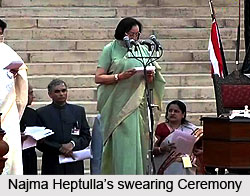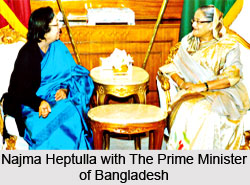 Dr. Najma Heptulla is a veteran Indian politician, now serving as Minister of Minority Affairs in Government of India, under the Prime Ministership of Narendra Modi. Dr. Najma Heptulla was five time a member of Rajya Sabha, the Upper House, between 1986 and 2012, and Deputy Chairperson, Rajya Sabha for sixteen years. She was a member from Rajasthan from July 2004 to July 2010. She was nominated by the Bharatiya Janata Party for the Upper House, Rajya Sabha in 2012 from Madhya Pradesh, and assumed her office on 24 April 2012.
Dr. Najma Heptulla is a veteran Indian politician, now serving as Minister of Minority Affairs in Government of India, under the Prime Ministership of Narendra Modi. Dr. Najma Heptulla was five time a member of Rajya Sabha, the Upper House, between 1986 and 2012, and Deputy Chairperson, Rajya Sabha for sixteen years. She was a member from Rajasthan from July 2004 to July 2010. She was nominated by the Bharatiya Janata Party for the Upper House, Rajya Sabha in 2012 from Madhya Pradesh, and assumed her office on 24 April 2012.
She is a grand niece of Maulana Abul Kalam Azad, an important Indian freedom fighter and a strong proponent of United India, and its first Minister of Education after Independence of India in 1947. She is also the former Vice President of the Bharatiya Janata Party (BJP). She is also a second cousin to Indian actor Aamir Khan. Dr. Najma Heptulla contested the 13th Vice-Presidential Elections held in August 2007 but lost to Hamid Ansari, who is now serving as Vice President of India.
Early Life of Dr. Najma Heptulla
Dr. Najma Heptulla was born on 13th April 1940 in Bhopal, Madhya Pradesh. Her father name was Syed Yusuf Ali and Fatima Yusuf Ali. She did her schooling from Motilal Vigyan Mahavidyalaya (MVM) Bhopal, and holds both a Masters` of Science Degree in Zoology, and a Ph.D. in Cardiac Anatomy from the University of Denver.
Political Life of Dr. Najma Heptulla
Dr. Najma Heptulla came into limelight when she joined the Indian National Congress. She headed several divisions of the party`s grassroots organizations. She was the General Secretary of Indian National Congress during 1986 with the additional responsibility of youth activities of the All India Congress Committee and the National Students` Union of India (NSUI). Since 1980, she has been a member of the Rajya Sabha from Maharashtra for four terms at 1980, 1986, 1992, 1998 as Indian National Congress candidate. Najma Heptullah was the Deputy Chairperson of the Rajya Sabha from January 1985 to January 1986 and from 1988 to July 2004.
 Dr. Najma Heptulla was nominated to head the Indian Council of Cultural Affairs, while she was in Indian National Congress. She also presided over the women parliamentarians` group of the Inter-Parliamentary Union in 1993. She was also the founder President of the Parliamentarians` Forum for Human Development in the year1993. Dr. Najma Heptulla was also elected President of Inter-Parliamentary Union (IPU), a Geneva-based worldwide association at Council`s 165th session in Berlin in 1999.
Dr. Najma Heptulla was nominated to head the Indian Council of Cultural Affairs, while she was in Indian National Congress. She also presided over the women parliamentarians` group of the Inter-Parliamentary Union in 1993. She was also the founder President of the Parliamentarians` Forum for Human Development in the year1993. Dr. Najma Heptulla was also elected President of Inter-Parliamentary Union (IPU), a Geneva-based worldwide association at Council`s 165th session in Berlin in 1999.
Dr. Najma Heptulla held the post from 16 October 1999 to 27 September 2002. Subsequently, in 2002, at Council`s 171st session, she was chosen the Honorary President of the IPU Council. Dr. Najma Heptulla was nominated by the United Nations Development Programme as its Human Development Ambassador. Heptulla led a delegation to the UN Commission on Status of Women in 1997.
In 2004, Najma Heptullah joined Bharatiya Janata Party. In 2007, the Bharatiya Janata Party-led National Democratic Alliance chose her as a candidate in elections for the Vice President of India, which was won by Hamid Ansari.
When Nitin Gadkari was the President of BJP, she became as one of the 13th Vice Presidents of the BJP in 2010, where later when Rajnath Singh took over, she was made a member of the National Executive of BJP. Now after the glorious victory in Indian General Election, 2014, Dr. Najma Heptullah was appointed as Minister of Minority Affairs in newly elected Prime Minister, Narendra Modi`s cabinet. She took the oath on 26th May, 2014.
Books by Dr. Najma Heptullah
Heptulla has authored the book on AIDS titled "AIDS: Approaches to Prevention". She is dominated on human social security, sustainable development, environment, reforms for women and on ties between India and West Asia.
Personal Life of Dr. Najma Heptullah
She is married to Akbarali A Heptulla in 1966, and has three daughters. Her husband, Akbarali A Heptulla, was a manpower consultant, was instrumental the establishment of the Patriot newspaper in the 1960s. He died on September 4, 2007, in New Delhi at the age of 75.




















